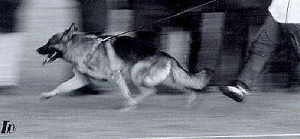Doing Your Homework
The Search for a Breeder
By Christine Gajda
(originally published in USA magazine, Jan/Feb 2007)
The decision to purchase a German Shepherd Dog can lead a potential owner into a confusing maze of questions and promises. What should be a happy, stree-free event can often turn into a perplexing puzzle. Considering that the lifespan of a German Shepherd will be 10 years or more, this is certainly a decision not to be taken lightly. Poor choice of a breeder can leave you with an unhealthy dog or one with poor or questionable temperament. Finding a good breeder takes time and research, but it is well worth the effort. In buying a dog you are entering into a relationship with the dog's breeder. Their knowledge and choice of breeding stock, as well as 'customer support' after the dog goes home with you can prove to be a blessing or a curse! The following guidelines can help a potential buyer find a responsible breeder that best suits their needs.
KNOW YOUR BREED. Knowing the breed standard is a MUST! Not only will it help you ask intelligent questions of the breeder, it will help you 'read' their answers. Furthermore, recognize that there are many 'types' of the same breed, beyond the concept of working lines and showlines. Many countries have taken the breed in slightly different directions, and being aware of that will help you find a dog that suits your purposes.
KNOW YOUR QUESTIONS. Formulate a list of questions that you feel are important, and write them out to take with you when you meet the breeder. A responsible breeder will appreciate your thoroughness and not be offended. It is all too easy to get sidetracked when viewing kennels and dogs. It is important that you ask clear questions, and get clear answers. A good breeder will be happy to spend time with you answering your questions, as they will be looking for the best possible homes for their pups. Some important questions to include are:
Can I meet the parents of the litter? Your pup will inherit not only physical characteristics, but temperament as well. Meeting the sire and dam will help give you an idea of what you may have in your home in a few years. If possible, ask to see them work as well.
Are the parents certified to be free of hip dysplasia, and how far back does the certification go? Some registries require this certification, while others do not, but a responsible breeder will NOT breed dogs that are not certified. There is no guarantee that all pups will be free of hip problems, as there are a multitude of contributing factors, but only breeding certified parents reduces the risk of problems. Ask for the OFA or other certification numbers (such as the "a" stamp), and verify them on your own. Unscrupulous breeders may lay claim to certifications and titles that do not exist. This is research time well spent.
How old is the dam? Just because a female is able to produce puppies, does not mean that she should. Breeding a female either too young or too old is a sign of a breeder that is more interested in money than proper breeding practices.
How do you socialize your pups? A good breeder will have a well thought out plan for early socialization. The pups need a variety of regular human contacts, with people of all ages and sizes, as well as exposure to different surfaces to walk on, various noises, objects and situations. Pups should not spend all of their time in their kennel with their littermates.
Can I see the kennel? The entire kennel area should be available to see, and responsible breeders should be happy to show you their clean, humane facilities.
How many dogs are on site, and how many people do you employ? A high dog to human ratio implies that the dogs, although possible clean and well fed, are largely left to themselves. This is especially important when purchasing a puppy, when early human contact is of utmost priority.
Are you involved with showing, training, and titling your dogs and your clients' dogs? This is a sign of commitment to the breed beyond producing puppies, and allows a breeder to better know their dogs' strengths and weaknesses, as well as their temperaments. It furthermore shows commitment to continuing education about the breed and how it is developing, as well as confidence in the quality of their stock and the pups they produce. Ask to come watch a training session, and observe how the dogs work and are handled.
Why did you choose to breed these two particular dogs, and how do they compliment each other? A good breeder should have well thought out breeding choices, beyond choosing the most recent winner at a national event or Seiger show. They should be able to explain the rationale for their breeding choices in detail, not just try to impress you with the accomplishments of either parent.
KNOW YOUR TITLES. Breeders love to list their dogs' titles and awards, and certainly they are worth noting. Keep in mind however, that not all letters following a dog's name are equal - some denote temperament certificates, AKC titles (such as obedience, rally, and agility), flyball titles, instinct testing and certificates, and so on. The working titles from different countries and organizations alone can create confusion, as essentially the same routines can appear to be different titles (such as SchH, VPG, IPO, ZVV). Every title has it's place, but don't be fooled by a long list of letters surrounding a dog's name. Research what they mean. Determine what is important for you and what you plan to do with your dog.
KNOW YOUR PAPERS AND THE PROCESS INVOLVED IN GETTING THEM. If your dog is whelped in the United States, you will need AKC papers. AKC papers are not an assurance of quality, but simply a way of proving that your dog is purebred. They are also required for entry in many events. If you leave the breeder without the application of individual registration in hand, there is no guarantee that you will ever receive it. The AKC will not intervene in a breeder-client dispute, as it is simply a registry. If a breeder either decides to withhold or is ultimately unable to provide papers for your dog, it is a matter for a lawyer, not the AKC, and one that is not settled cheaply. Furthermore, many breeders sell their pups on limited registration. Be sure that you understand their reasoning, and that you are willing to accept that it may never be lifted. Lastly, there are many complicated scenarios involving imports and breedings outside of the United States that can delay the process of receiving papers. Ask for details and timelines, and realize that there are risks involved. Ethical breeders always deliver their papers, but you should make yourself aware of all details relating to your purchase.
KNOW HOW YOU WILL BE CHOOSING YOUR PUP. A good breeder is just as concerned with which pup you take home as you are, and will make every effort to make a good match. They will ask as many questions of you as you do of them, and should be able to describe what they have observed about various pups in the litter. They should be open to you spending time observing and testing the pups, and should have no problem with you bringing someone along with you to help select the pup, should you desire to do so.
KNOW YOUR CONTRACT. All reputable breeders will offer you a written contract, and it should be available for preview before you put a deposit on a pup. If you desire, you should be able to take a copy home with you to re-read. Many breeders post their contracts on their websites. The contract should be in plain, understandable terms, and not in need of excessive explanation. If you have questions, the breeder should offer clear answers and should be willing to put the clarifications in writing if you ask.
KNOW YOUR GUARANTEES. Most responsible breeders will offer replacement guarantees on dogs which evidence genetic problems such as crippling hip dysplasia. Know the fine points, such as where the diagnosis must be made and in what time frame, how the breeder must be notified, and if the dog must be returned in order to receive a replacement. Even if this is explained to you, it should be in writing, and signed by both parties. Ask if there are provisions in the event that a dog purchased for a specific purpose develops a physical flaw that prevents it's intended use (example, a 'top show puppy' that develops a disqualifying overbite). Good breeders ALWAYS stand behind the pups they produce, keep in mind however, that no breeder should be responsible for owner negligence, and most breeders have clauses to that effect.
KNOW YOUR LOCAL CLUBS. This will prove to be one of the best resources a potential buyer can find. Club members will be thrilled to share their good experiences with a breeder, and will warn you of bad ones. You may be able to see or hear about specific dogs that the breeder has produced that are older and achieving titles. This is time well spent. You will also get an idea of the kind of breeder support you may receive after purchase.
KNOW YOUR CHANCES. Call the Better Business Bureau. Call the AKC. Call the governing organizations for your breed. Ask if there have been complaints filed against a particular breeder. Chances are, there haven't been, but if there were, it's best to know in advance that someone was disgruntled enough to file a formal complaint. This doesn't indicate that the breeder is bad (the buyer may have been at fault), however, it does indicate that further research is needed.
Buying a pup should never be an impulse, quick decision, but rather done as a commitment to the dog for its lifetime. Taking the extra time to research prior to purchase greatly improves your chances of getting a dog that is right for your personality, lifestyle, and goals. There are extensive resources available to potential buyers, and it is important to utilize as many of them as possible. Hopefully the end result will be that the breeder, the buyer, and of course the dog (!) have a happy, long lasting relationship.



No comments:
Post a Comment